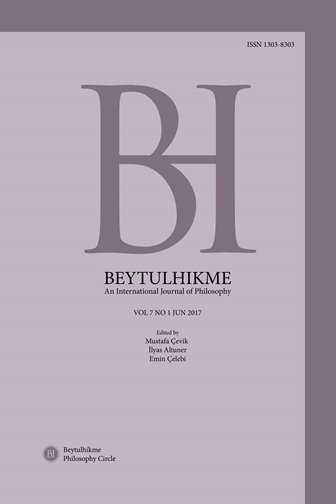Author :
Abstract
Tüm tarih çalışmalarının aslında birer anlatı olduğunu öne süren Fransız felsefeci ve yorumbilimci Paul Ricoeur’ün, tarihi anlatı olarak nasıl temellendirdiğini serimlemek, bu çalışmanın amacını oluşturmaktadır. Zaman ve anlatı arasında bir karşılıklılık ilişkisi olduğunu düşünen Ricoeur için, anlatı, yaşamın zamansallığını ortaya çıkaran evrensel olarak yaygın bir söylem sınıfını oluşturur. Hem insanın kendi iç yaşamıyla hem de ortaklaşa yaşamla ilgili olan belleğin bildirici biçiminin, anlatı yoluyla kurulduğunu savunan Ricoeur, tarihyazımının anlatısal söyleme bağlı olduğunu, diğer bir ifadeyle, tarihin eninde sonunda anlatısal olduğunu öne sürer. Ona göre, tarihin tarihsel olma özelliği anlatısal söylemle olan bağından kaynaklanır. Ricoeur için, zamanın biçimlendiricisi ya da düzenleyicisi olan anlatı, zamanı ortaya çıkarmak gibi önemli bir özelliğe sahip olduğundan, anlatılan/öykülenen zaman, kozmolojik zamanı ve fenomenolojik zamanı birbirine bağlayan adeta bir köprü işlevi görür.
Keywords
Abstract
The objective of this study is to expose how Paul Ricoeur, the French philosopher and commentator, who propounds that all historical studies are intrinsically a narrative, has founded history as narratives. For Ricoeur, who considers that there is a reciprocity relationship between time and narrative, the narrative creates a universally widespread class of discourse that reveals the temporality of life. Ricoeur argues that the narrative form of the memory, which is related to both the inner life of humans and the collective living, is founded by narration, and suggests that the historical writing is linked to narrative discourse, in other words, history is a narrative. According to him, the historical feature of history generates from its relation to the narrative discourse. For Ricoeur, narrative which is the formative or regulator of time and since it has such a prominent feature of revealing time that it functions as a bridge which links the time/the narrated time and cosmological time and phenomenological time.
Keywords
- Acar, S. M. (2008). Paul Ricoeur’ün Anlatı ve Tarih Görüşü Bağlamında Arthur C. Danto’nun “Anlatı Cümleleri”nin Değerlendirilmesi. Araştırma: Ankara Üniveristesi Dil ve Tarih-Coğrafya Fakültesi Felsefe Bölümü Dergisi, 19, 1-20.
- Aristoteles (1987). Poetika (çev. İ. Tunalı). İstanbul: Remzi Kitabevi.
- Aristoteles (1996). Metafizik (çev. A. Arslan). İstanbul: Sosyal Yayınlar.
- Augustine (2005). The Confessions of Saint Augustine. San Diego: ICON Group International, Inc.
- Bacon, F. (1999). Novum Organum (çev. S. Önal Akkaş). Ankara: Doruk Yayınları.
- Collingwood, R. G. (2000). Tarih Felsefesi Üzerine Denemeler (çev. E. Özvar). İstan- bul: Ayışığı Kitapları.
- Collingwood, R. G. (2013). Tarih Tasarımı (çev. K. Dinçer). Ankara: Doğu Batı Yayınları.
- Delice, D. (2011). Annales Okulu ve Ricoeur’ün “Anlatı” Bağlamında Annales Okulu Eleştirisi. History Studies: International Journal of History, 3(2), 101-124.
- Dereko, A. (2015). Von Wright’ta Açıklama ve Anlama. Dicle Üniversitesi Sosyal Bilimler Enstitüsü Dergisi, 14, 16-41.
- Direk, Z. (2008). Paul Ricoeur’le Söyleşi: Hafıza, Tarih, Unutma. Cogito, 56, 192- 201.
- Dosse, F. (2008). Bellek Izlerini Tarihselleştirmek. Cogito, 56, 125-139.
- Kearney, R. (2008). Dilin ve Mitin Poetikası: Paul Ricoeur’le Söyleşi (çev. E. Simson). Cogito, 56, 141-159.
- Özlem, D. (2010). Tarih Felsefesi. İstanbul: Say Yayınları.
- Rızvanoğlu, E. (2008). Ricoeur’de Söylem, Yorum, Metin ve Anlam Cogito, 56, 218- 234.
- Ricoeur, P. (1985a). Narrated Time, Philosophy Today, 29 (4), 259-272.
- Ricoeur, P. (1985b). Time and Narrative (trans. K. McLaughlin & D. Pellauer). Vol. III. USA: The University of Chicago Press.
- Ricoeur, P. (2000). La Memoire, l’Histoire, l’Oubli. Paris: Editions Du Seuil
- Ricoeur, P. (2007). Zaman ve Anlatı: Bir: Zaman-Olayörgüsü-Üçlü Mimesis (çev. M. Rifat & S. Rifat). İstanbul: Yapı Kredi Yayınları.
- Ricoeur, P. (2008). Özgürlük ve Kurumları (çev. Ö. B. Albayrak). Cogito, 56, 85-96.
- Ricoeur, P. (2009). Zaman ve Anlatı: Iki: Tarih ve Anlatı (çev. M. Rifat). İstanbul: Yapı Kredi Yayınları.
- Ricoeur, P. (2012a). Zaman ve Anlatı: Üç: Kurmaca Anlatıda Zamanın Biçimlenişi (çev. M. Rifat). İstanbul: Yapı Kredi Yayınları.
- Ricoeur, P. (2012b). Hafıza, Tarih, Unutuş (Çev. M. E. Özcan). İstanbul: Metis
- Ricoeur, P. (2013). Zaman ve Anlatı: Dört: Anlatılan (Öykülenen) Zaman (çev. U. Öksüzan & A. Altınörs). İstanbul: Yapı Kredi Yayınları.
- Rifat, M. (2008). “Daha Iyi Anlamak Için Daha Fazla Açıklamak” Isteyen Bir Yorumbilimci: Paul Ricoeur. Cogito, 56, 51-58.
- Sarlo, B. (2012). Geçmiş Zaman: Bellek Kültürü ve Özneye Dönüş Üzerine Bir Tartışma (çev. P. B. Charum & D. Ekinci). İstanbul: Metis Yayınları.
- Snow, C. P. (2005). İki Kültür (çev. T. Birkan). Ankara: TÜBİTAK Yayınları.
- White, H. (2008). Metatarih: 19. Yüzyıl Avrupası’nda Tarihsel Imgelem (çev. M. Küçük). Ankara: Dost Kitabevi Yayınları. Öz: Tüm tarih çalışmalarının aslında birer anlatı olduğunu öne süren Fransız felsefeci ve yorumbilimci Paul Ricoeur’ün, tarihi anlatı olarak nasıl temellendirdiğini serimlemek, bu çalışmanın amacını oluşturmaktadır. Zaman ve anlatı arasında bir karşılıklılık ilişkisi olduğunu düşünen Ricoeur için, anlatı, yaşamın zamansallığını ortaya çıkaran evrensel olarak yaygın bir söylem sınıfını oluşturur. Hem insanın kendi iç yaşa- mıyla hem de ortaklaşa yaşamla ilgili olan belleğin bildirici biçiminin, anlatı yoluyla kurulduğunu savunan Ricoeur, tarihyazımının anlatısal söyleme bağlı olduğunu, diğer bir ifadeyle, tarihin eninde sonunda anlatısal olduğunu öne sürer. Ona göre, tarihin tarihsel olma özelliği anlatısal söylemle olan bağından kaynaklanır. Ricoeur için, zamanın biçimlendiricisi ya da düzenleyicisi olan anlatı, zamanı ortaya çıkarmak gibi önemli bir özelliğe sahip olduğundan, anlatılan/öykülenen zaman, kozmolojik zamanı ve fenomenolojik zamanı birbirine bağlayan adeta bir köprü işlevi görür. Anahtar Kelimeler: Anlama, açıklama, anlatı, olayörgüsü/senaryolaştırma, tarih, tekil neden yükleme, yarı-nedensel açıklama.





